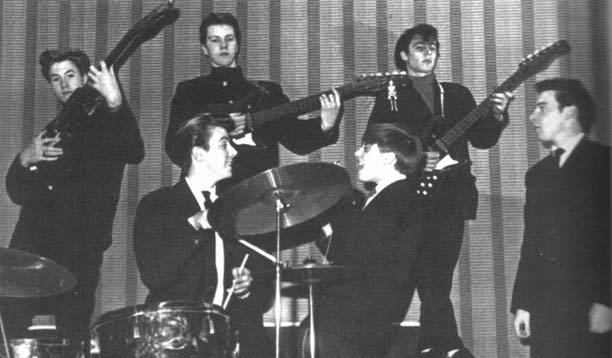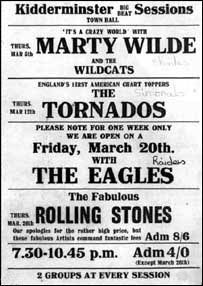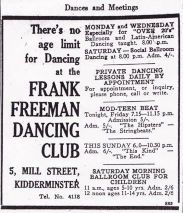The Midland Scene
At the end of the 1950’s, Britain was still feeling the after effects of the War and the post-war generation were growing up… flexing their collective muscle to such an extent that their own (generational) rejection of parental values would be seismic compared to other generation-gaps.
Youth Clubs were a key fixture within the urban and semi-urban landscape of post-War Britain; indeed, many were set up simply to keep the ‘youth’ off the streets and to offer them ‘interests’.
“I became fascinated with popular music when I was about twelve – I loved the ‘American sound’ and, also, I very much liked the British boys and girls who aped it… When I was fourteen, I started going to a couple of the Kidderminster youth clubs. Activities were normal YC kind of things – table tennis, bar billiards, darts etc – all undertaken to a background of popular music.”
As radios and early television sets were tuned in to see Elvis Presley startle parents and teenagers alike; an unexpected musical revolution was underway. The generational gap opened, never to close again.
In the cities outside of London – such as Liverpool, Birmingham, Manchester and Glasgow – ‘pop’ music was being further shaped by R’n’B imports which spawned a highly competitive band scene as local groups formed to play the newest and hottest tunes from America.
“There were also starting to be a few gigs to attend where the new and ever-increasing local beat combos would whip us youthful types into a dancing frenzy. One of the new breed of groups were playing. They were called The Raiders and were seriously good – quite a cut above the rest. They did have a singer but played mostly instrumentals – Ventures, Duane Eddy, Shadows and more obscure American stuff.
‘The singer did just a couple of songs – I don’t really remember which exactly but it was probably ‘Halfway to Paradise’ – ballads anyway. I don’t know what came over me – perhaps a combination of youthful exuberance, half a pint of cider or, the fact that the drummer, Chris Hayes, lived two doors up from me on Habberley Lane.
‘Anyway, during a break, I asked the guitar player if they knew ‘Shakin’ All Over’ by Johnny Kidd and The Pirates – he said ‘yeah’ and I said that I could sing it really well.
‘Next thing I know, I’m up on stage doing it and, of course, loving every second of it. I remember all the crowd cheering and that it was a very special feeling and… something I’d not felt before.”
Such was the response from the assembled company, that Jess was immediately recruited. Almost before they knew it, The Raiders had a new singer.
‘I joined the group and started doing the more rocky tunes whilst Keith, the other singer whose surname, I’m ashamed to say, is lost to me now did the ballads. Actually, he called it a day, pretty soon after I joined.”
The now five-piece Raiders – sporting the best equipment hire-purchase could afford (including a pristine Fender Precision bass for Rob Newell) played all the local halls and youth clubs as well as frequenting Frank Freeman’s which became their base as well as rehearsal room.
‘We played all the local venues quite frequently but I don’t recall ever venturing much further than Stourport on Severn which was about 15 miles away.”
As the band grew in stature – attracting something of a local following, they moved up a notch and began playing support sets at Kidderminster Town Hall.
They also ventured further afield to Stourbridge’s Town Hall as support for the ‘Big Beat Sessions’ including – The Hollies, Tom Jones, The Yardbirds (who, at that point, featured Eric Clapton) and The Small Faces.
‘I don’t think we ever recorded anything – although, Colin Hepwoood, the lead guitarist, did have a tape recorder because I remember being at his house and he recorded me singing some stuff.
‘Blimey… now I come to think of it, we might have been trying to write a song…!”
Jess sang with The Raiders for 18 months before The Shakedown Sound

THE RAIDERS. From left: Rob Newell; Chris Hayes; Mick Thomas; JR; Colin Hepwood with Norris Cale (manager)


